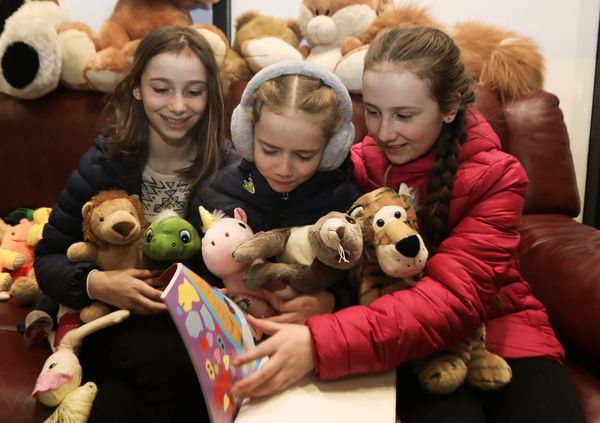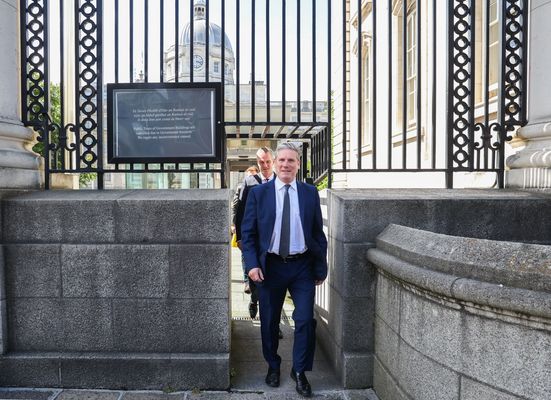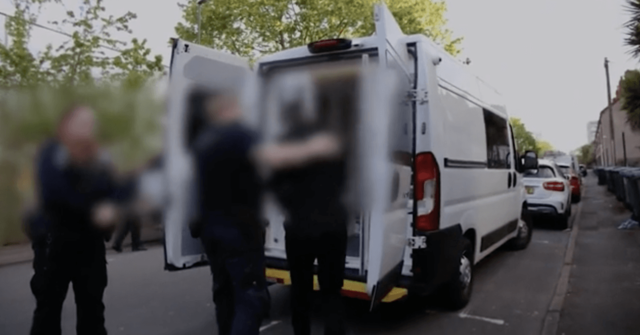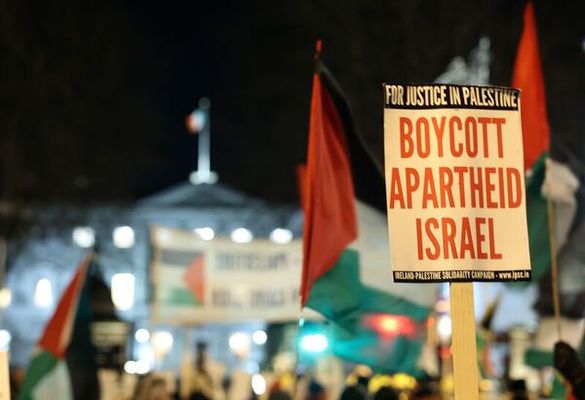As if Brexit, Covid and the climate emergency were not enough, along comes Putin’s war against Ukraine. The human tragedy of destroyed lives, homes and whole cities ripples out into the displacement of millions within Ukraine and refugees crossing European borders in search of sanctuary – for how long, no-one knows. We are back to the gruesome business of war crimes and fights over the destruction of evidence and witnesses to what is occurring.
The ripples go far beyond the war zone, of course. There is a price to pay for the imposition of economic sanctions against individuals closely associated with the Putin regime and against the Russian economy itself. Most immediately these measures impact on the world markets for gas and oil, causing a surge in inflation and an anticipated interruption of supplies of many commodities including food if this year’s crops cannot be sown or harvested due to the war.
“We brought 25,000 people over from Syria - again, more than any other country in Europe.”
— Mike Galsworthy 🇺🇦 (@mikegalsworthy) March 11, 2022
What an arrant lie. Has he ever heard of a country called ‘Germany’? pic.twitter.com/L48T15wCwB
Ukraine is the world’s biggest producer of sunflower oil. It exports millions of tons of wheat, maize, potatoes, barley and sugar beet in a normal year. Not forgetting honey.
This comes on top of the $8 billion shortfall in funding the UN’s World Food Programme which is now predicting famine in parts of Africa and the Middle East. Ukraine and Russia normally supply half of Africa's wheat imports.
Britain insists on visa applications via a hard-to-reach bureaucracy, while Europe responded to the emergency by waiving visa requirements.
Those place names attached to the streets of Shankill and Lower Falls – Crimea, Odessa and Sevastopol – are once again a familiar part of daily war news, as they were when Hitler’s troops besieged the area in 1941 and 1942, before defeat by the Soviet Red Army at Stalingrad in January 1943.
THREADS THAT CONNECT
Our street names mark the Crimean War which began 28 March 1854 and ended in the defeat of Russia in 1856 by the combined forces of France, Britain and the Ottoman Empire. That war is still memorialised for Florence Nightingale’s attention to basic hygiene and disease control in caring for the wounded, although her radicalism lay more in her use of statistics and data visualisations.
There are other threads that connect us to Ukraine, both old and new. If there is one Ukrainian word we should all know it’s ‘Holodomor’ – death by famine. This refers to the mass starvation of millions of ethnic Ukrainians in 1932 and 1933.
🇺🇦 At the entrance to the memorial park in Kyiv, there is a sculpture of an extremely thin girl with a very sad look holding a handful of wheat in her hands. Behind her back is the Candle of Remembrance. This monument commemorates the Holodomar pic.twitter.com/35FOFbU1Jh
— Amber💋 (@RedheadedAg) March 13, 2022
As with our own An Gorta Mór, there are disputes as to the scale of the catastrophe, who was responsible and what might have been done to prevent it. In most historical accounts, Stalin’s collectivisation policy is heavily implicated, that is once people were even allowed to discuss the events openly.
But since 2006, Ukraine has officially recognised the Holodomor as a genocide carried out by the Soviet government of the day against the Ukrainian people. Fourteen countries – mainly eastern European, but also Canada and Australia – have similarly recognised the Holodomor as an act of genocide and a further five countries (including Spain) have gone further, declaring it as a criminal act of Stalin’s regime.
Responses to the Ukrainian refugee crisis highlight once again the policy differences either side of the border arising from partition. Britain insists on visa applications via a hard-to-reach bureaucracy, while Europe responded to the emergency by waiving visa requirements.
And while all this was going on, Westminster is introducing the “barbaric” Nationalities and Borders Bill. This not only allows for Australian-style off-shore processing of asylum claims, assuming Britain can find a willing country or far away island, but it also introduces an immigration border on the island of Ireland.
Anyone who does not hold an Irish or British passport will have to register online for a visa waiver if they wish to cross from the South to the North. Great for tourism, business travel and any Ukrainian refugees wanting to link up! BEFORE THE BOMBARDMENT: The main train station and city of Kharkiv in Ukraine before the war. Pic: Yaroslav Romanenko on unsplash.com
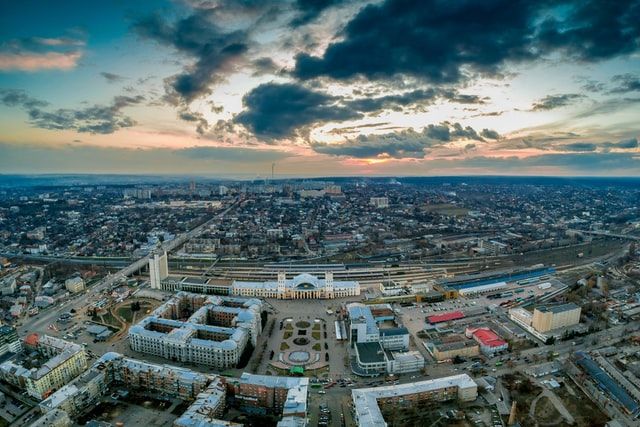
Another connection is the French missile manufacturer Thales, based in Castlereagh. At least 2,000 anti-tank shoulder-mounted weapons made by Thales have been supplied to Ukraine. The company also makes the Starstreak anti-aircraft missile which Johnson has promised to send.
The Ukrainians have not just prepared for such ‘conventional’ warfare, they have also anticipated the need for guerrilla-type warfare if Russia takes control of substantial territory and major cities – hence the widely-reported preparation of Molotov cocktails (petrol bombs). The Sunday World (20 March) even claimed that the IRA’s Green Book has been translated into Ukrainian and distributed among soldiers and intelligence officers. Apparently, an army general came across the Green Book online and ordered it to be translated.
INFLATION THE MAIN FALL-OUT
It is, of course, inflation that is the main fall-out from the war on Ukraine, the engine for which is the higher cost of energy. Last week’s Spring Statement from Westminster was the opportunity for the British Chancellor to address the rapidly rising cost of living. He did so with what can only be described as a strategy of inequality.
At the top of the wealth spectrum, nothing was done to tax unearned income from property and shareholdings. When it comes to those on the lowest fixed incomes from benefits – the unemployed, the retired, the long-term sick and the disabled – they are off the Chancellor’s radar altogether. Relative to predicted inflation, benefits will be worth about five per cent less in a few months’ time. Overall, disposable incomes in 2022/3 will fall 2.2 per cent, the biggest ever annual drop since records began in the 1950s. After this there is to be an electioneering cut to income tax in 2024.
Confirmed by Treasury sources that this Kia is not Rishi Sunak’s car but is actually owned by a Sainsbury’s employee. The Chancellor apparently paid for the petrol. pic.twitter.com/xCXPucEvX3
— Ben Kentish (@BenKentish) March 24, 2022
The Chancellor did nothing about energy policy which he is still arguing about with Johnson who is a fan of nuclear. He could have gone for a windfall tax on the energy companies and immediately redistributed the proceeds. He could have used the disruption of the war to accelerate investment in renewable energy sources, to extend free public transport and to transform the housing stock. Certainly, these are the types of policies urgently needed across Ireland.
LACK OF DELIVERY
North and South, the potential of wind power has long been recognised but not yet realised. Floating off-shore turbines (an established technology), say Wind Energy Ireland, have the potential to transform Ireland into a net exporter of electricity from this source alone. A Dutch company is proposing a cluster of turbines in the North Channel near Larne, having identified the North as “one of the cheapest places to build floating off-shore wind”.
The problem is lack of delivery. In the South, WEI complain that the key public agencies – Eirgrid, An Bord Pleanála and the Commission for Regulation of Utilities – lack the resources and expertise to deliver at the pace required. In the North? Well, there are much more important priorities like the dog fights within unionism, DUP withdrawal from the Executive and with it, the freezing of new funding for health.

